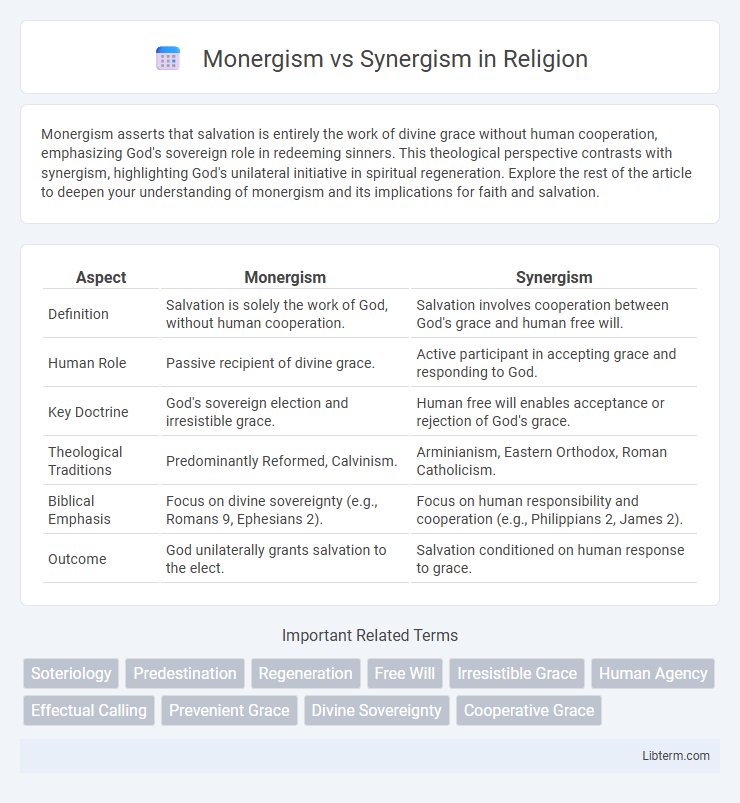Monergism asserts that salvation is entirely the work of divine grace without human cooperation, emphasizing God's sovereign role in redeeming sinners. This theological perspective contrasts with synergism, highlighting God's unilateral initiative in spiritual regeneration. Explore the rest of the article to deepen your understanding of monergism and its implications for faith and salvation.
Table of Comparison
| Aspect | Monergism | Synergism |
|---|---|---|
| Definition | Salvation is solely the work of God, without human cooperation. | Salvation involves cooperation between God's grace and human free will. |
| Human Role | Passive recipient of divine grace. | Active participant in accepting grace and responding to God. |
| Key Doctrine | God's sovereign election and irresistible grace. | Human free will enables acceptance or rejection of God's grace. |
| Theological Traditions | Predominantly Reformed, Calvinism. | Arminianism, Eastern Orthodox, Roman Catholicism. |
| Biblical Emphasis | Focus on divine sovereignty (e.g., Romans 9, Ephesians 2). | Focus on human responsibility and cooperation (e.g., Philippians 2, James 2). |
| Outcome | God unilaterally grants salvation to the elect. | Salvation conditioned on human response to grace. |
Introduction to Monergism and Synergism
Monergism asserts that salvation is the work of God alone, emphasizing divine sovereignty and grace without human cooperation, while Synergism highlights the cooperative effort between God and humans in the salvation process. Monergism is rooted in Reformed theology, particularly Calvinism, whereas Synergism aligns with Arminianism and Eastern Orthodox teachings. Understanding these doctrines clarifies key theological debates about human free will, divine grace, and the nature of salvation.
Defining Monergism: God’s Sole Role in Salvation
Monergism emphasizes God's sole role in salvation, asserting that regeneration and the impartation of grace are acts performed exclusively by divine power without human cooperation. This theological view highlights total depravity and unconditional election, where human will is passive and God unilaterally initiates and completes salvation. Key scriptural references include Ephesians 2:8-9 and John 1:12-13, supporting that salvation is entirely a work of God's sovereign grace.
Defining Synergism: Human Cooperation in Salvation
Synergism in theology emphasizes human cooperation with divine grace in the process of salvation, asserting that humans play an active role in responding to God's call. This concept contrasts with monergism, which holds that salvation is entirely the work of God without human contribution. Synergism highlights the partnership between God's initiating grace and human free will in achieving redemption.
Historical Roots of Monergism and Synergism
Monergism finds its historical roots in Reformation theology, particularly within the teachings of Martin Luther and John Calvin who emphasized God's sovereign grace in salvation without human cooperation. Synergism, on the other hand, traces back to early Church Fathers and Augustine's evolving views, emphasizing a cooperative process between divine grace and human free will. The Council of Trent solidified synergistic theology in Roman Catholic doctrine, contrasting with the monergistic stance of Protestant Reformers.
Key Theological Distinctions
Monergism asserts that salvation is solely the work of divine grace, where God unilaterally regenerates the sinner without human cooperation, emphasizing total depravity and irresistible grace. Synergism maintains that human free will cooperates with divine grace, highlighting prevenient grace that enables individuals to respond to God's offer of salvation. The key theological distinction centers on the role of human will: monergism denies any human contribution to regeneration, while synergism affirms a collaborative process between divine influence and human response.
Scriptural Basis for Monergism
Monergism is rooted in scriptural passages emphasizing God's sovereign grace in salvation, such as Ephesians 2:8-9, which highlights salvation as a gift not earned by works but granted by faith through grace. Romans 9 underscores God's decisive election, illustrating that God's will alone initiates and completes salvation without human cooperation. Passages like John 6:37 affirm that all whom the Father gives to Christ will come to Him, underscoring monergism's core principle of divine monolithic act in regeneration and justification.
Scriptural Basis for Synergism
Synergism is supported by scriptural passages such as Philippians 2:12-13, which emphasizes working out salvation with fear and trembling while acknowledging God's enabling grace. Verses like James 2:17 highlight the necessity of faith accompanied by works, indicating human cooperation with divine action. Synergists interpret Ezekiel 36:27 as God giving believers the Spirit to empower willing participation in sanctification, underscoring a collaborative relationship between divine grace and human response.
Major Denominations and Their Positions
Major Christian denominations differ on Monergism and Synergism, with Reformed and Presbyterian churches generally advocating Monergism, emphasizing God's sole role in salvation. Roman Catholic and Eastern Orthodox traditions support Synergism, highlighting the cooperative process between divine grace and human free will in salvation. Methodist and many Pentecostal denominations also endorse Synergism, stressing the importance of human response alongside God's initiating grace.
Debates and Controversies
The debates between Monergism and Synergism center on the nature of salvation, with Monergists asserting that God alone initiates and completes salvation, while Synergists argue that human free will cooperates with divine grace. Controversies often arise over scriptural interpretations, especially in passages related to predestination, election, and human responsibility. These theological disputes influence denominational doctrines and impact broader Christian discussions on grace, free will, and divine sovereignty.
Implications for Christian Life and Doctrine
Monergism emphasizes divine sovereignty in salvation, teaching that God alone initiates and completes salvation without human contribution, which upholds total depravity and ensures assurance of salvation. Synergism, highlighting cooperation between divine grace and human free will, shapes doctrines encouraging active human participation in faith and sanctification, impacting prayer, evangelism, and ethical responsibility. The theological divergence influences Christian life by framing sanctification either as a monergistic work of God or a cooperative process, thereby affecting pastoral counseling, worship practices, and doctrinal teaching on perseverance and repentance.
Monergism Infographic

 libterm.com
libterm.com